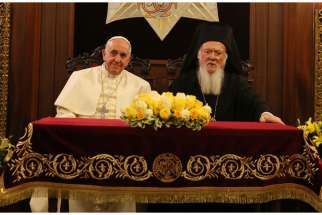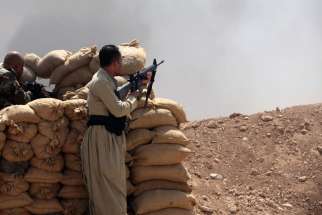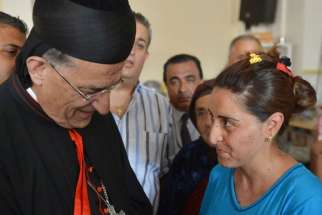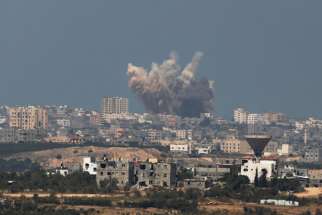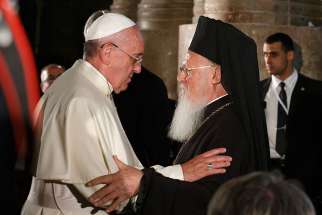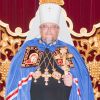Constantinople an Orthodox relic
Fifty years ago Blessed Paul VI went to Jerusalem — the first papal trip outside Italy in our time, inaugurating the practice of apostolic journeys — to meet Patriarch Athenagoras of Constantinople, primus inter pares of all the Orthodox patriarchs. It was a historic moment that, after nearly a millennia of separation, the Bishop of Rome, Successor of St. Peter and universal pastor of the Church, would meet with the Patriarch of Constantinople, the “New Rome,” successor of St. Andrew and ecumenical patriarch of all Orthodoxy.
BEIRUT - Catholic and Orthodox patriarchs of the Middle East denounced attacks on Christians and called upon the international community to work toward eradicating terrorist groups.
BEIRUT - A delegation of Catholic and Orthodox patriarchs visited Irbil, Iraq, to show their support and solidarity with the more than 100,000 Christians and minorities displaced in the country by the advance of Islamist militants.
Christian patriarchs denounce silence on persecution in Mideast
BEIRUT - Mideast Catholic and Orthodox patriarchs denounced the "total international silence" on the persecution of Christians in the Middle East and called for Muslim religious authorities to issue fatwas, or legal edicts, banning attacks against Christians and "other innocents."
Too early to confirm 2025 Orthodox-Catholic summit
VATICAN CITY - A Vatican spokesman said it’s premature to suggest a gathering between Catholic and Orthodox faiths to mark the 1,700th anniversary of the first Church council held in Nicea in 325.
Orthodox leader: North's America's churches can be example for Ukraine
PORTAGE LA PRAIRIE, Manitoba - Catholic and Orthodox churches in Canada and the United States can be an example for their counterparts in Ukraine, Canada's top Ukrainian Orthodox leader told the Ukrainian Catholic Synod of Bishops.
Ukrainian Orthodox Metropolitan Yurij of Winnipeg, addressing the worldwide synod Sept. 10, told the bishops it was "evident that our God is blessing us and helping us develop this better relationship."
"We also pray that in Ukraine this same attitude will develop as well," he said at the first meeting of the synod. The synod is private, but part of its initial session was open to media.
Metropolitan Yurij told several dozen Ukrainian Catholic bishops that the North American Catholic and Orthodox bishops have worked through the "animosity" that once marked relations between their Churches, and they now collaborate.
"In Ukraine, they have to go through the same kind of process," he said, and the bishops outside Ukraine must be patient with their brothers.
While the majority of Ukrainians are Orthodox, they are divided into three Churches: one in communion with the Russian Orthodox Church, one with a patriarch in Kiev and the third known as the Autocephalous Ukrainian Orthodox Church.
The forced unification of the Ukrainian Orthodox Church with the Moscow Patriarchate of the Russian Orthodox Church in the 1940s "is one of the principal problems," the metropolitan said.
The 2010 election of Ukrainian President Viktor Yanukovych, a member of the Orthodox Church in communion with the Moscow Patriarchate, appears to have fueled long-standing tensions between Orthodox loyal to Moscow and those who support an independent Orthodox Church in Ukraine. Yanukovych has worked to strengthen ties with Russia.
Metropolitan Yurij did not mention politicians. However, he did note that the Russian-affiliated Ukrainian Orthodox Church is the only one canonically recognized by the Ecumenical Patriarchate of Constantinople. So, for instance, when Patriarch Filaret of the Ukrainian Orthodox Church-Kiev Patriarchate visited Canada in April, Metropolitan Yurij did not meet with him.
"I have directors also," he said, referring to the ecumenical patriarch, considered first among equals of Orthodox leaders. "I am part of the community of the Orthodox, and he (Patriarch Filaret) is not recognized as a patriarch, so I could not meet him."
Archbishop Sviatoslav Shevchuk of Kiev-Halych, Ukraine, the elected head of the Ukrainian Catholic Church, told Metropolitan Yurij he often finds himself caught in the middle of the delicate situation in Ukraine.
Shevchuk deals with leaders of all three Ukrainian Orthodox churches. Yet every time he has contact with someone from one of the non-canonical Ukrainian Orthodox Churches, "right away a letter goes from Moscow to Rome" asking why the Ukrainian Catholic Church is collaborating with them.
"Directly or indirectly ... I end up being a kind of a go-between between the Orthodox Church and the Roman Catholic Church," he said.
Shevchuk said he, like his predecessor, Cardinal Lubomyr Husar, believes that "we can and we must be ambassadors of the whole Kievan Church," a term used to refer to all Eastern churches based in Ukraine.
Metropolitan Yurij and Winnipeg Archbishop James Weisgerber thanked the synod members for inviting them to the opening session and to the previous day's Divine Liturgy.
Weisgerber, former president of the Canadian Conference of Catholic Bishops, told them, "Sometimes we get the impression that — because the Roman Catholic Church is so large — that it has nothing to learn from anyone else.
"This is a great, great mistake. Often the smallest have the most important things to say," the archbishop said.
The synod was scheduled to meet behind closed doors in Portage la Prairie until Sept. 15 before a public closing celebration in Winnipeg Sept. 16.


